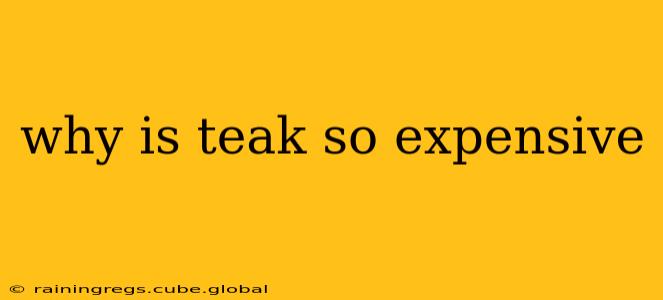Teak ( Tectona grandis) commands a premium price in the lumber market, and for good reason. Its high cost is a result of a confluence of factors, from its unique properties and slow growth to sustainable harvesting challenges and increasing global demand. Let's delve into the key reasons why teak remains a luxury wood.
What Makes Teak Unique? Its Exceptional Properties
Teak's desirability stems from its exceptional properties. It's renowned for its:
- Durability: Naturally resistant to rot, decay, and insect infestation due to high oil and silica content. This makes it ideal for outdoor applications where other woods would quickly deteriorate.
- Strength: Possesses remarkable strength and stability, making it capable of withstanding harsh weather conditions and heavy loads.
- Beauty: Features a rich, golden-brown color that deepens with age, developing a beautiful silver-gray patina over time. Its distinctive grain patterns further enhance its aesthetic appeal.
- Weather Resistance: Its inherent oils protect it from the damaging effects of sun, rain, and temperature fluctuations, minimizing the need for constant maintenance.
These qualities explain why teak is highly sought after for high-end furniture, decking, boat building, and other demanding applications. This inherent value directly translates to a higher price point.
The Slow Growth of Teak Trees
Teak trees are notoriously slow-growing. It can take decades, even centuries, for a teak tree to reach maturity and produce lumber of sufficient size and quality. This extended growth period significantly limits the supply, driving up the cost. Unlike fast-growing softwoods, the lengthy maturation process inherent in teak production impacts availability and price.
Sustainable Harvesting and Certification: A Growing Concern
The increasing awareness of deforestation and unsustainable logging practices has led to stricter regulations and certification programs for teak. Sustainably harvested teak, certified by organizations like the Forest Stewardship Council (FSC), commands a higher price due to its environmentally responsible sourcing. This commitment to sustainability adds to the overall cost but ensures the long-term viability of teak forests.
High Demand and Limited Supply: A Global Market Dynamic
Global demand for teak far surpasses the available supply. This imbalance between supply and demand is a major contributor to its high cost. As more consumers seek out this high-quality, durable wood, prices continue to climb.
Why is teak wood so expensive compared to other hardwoods?
The elevated cost of teak compared to other hardwoods is a direct result of the combination of factors discussed above: its superior properties, slow growth rate, sustainable harvesting practices, and high global demand. These elements contribute to a limited supply and high market value.
What makes teak wood so durable?
Teak's durability is attributable to its naturally high oil and silica content. These components act as natural preservatives, protecting the wood from rot, decay, and insect damage, even in demanding outdoor environments.
Is teak wood worth the cost?
Whether teak is "worth the cost" is subjective and depends on individual needs and priorities. However, its exceptional durability, beauty, and weather resistance often justify the investment for those seeking high-quality, long-lasting materials, especially for outdoor applications. The longer lifespan and reduced maintenance requirements can offset the initial higher cost over time.
Where is teak wood sourced from?
Teak is primarily sourced from Southeast Asia, with countries like Myanmar (formerly Burma), Thailand, and Indonesia being major producers. However, sustainable teak plantations are also being established in other regions to meet the growing global demand while minimizing environmental impact.
In conclusion, the high cost of teak is a reflection of its exceptional properties, sustainable harvesting practices, slow growth rate, and high global demand. While it's a premium material, its durability, beauty, and longevity often make it a worthwhile investment for discerning consumers.
